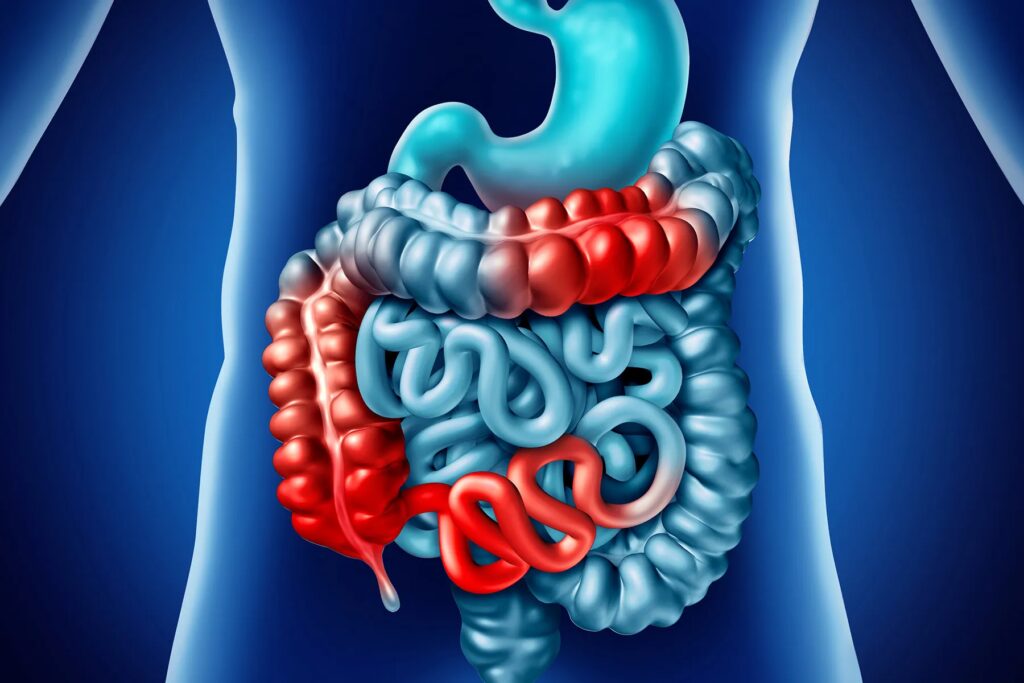March 24, 2023 – Joshua Denton was diagnosed with ulcerative colitis when he was a junior in college. He not only faced anxiety around a new health diagnosis, but how it could change the rest of his life.
His initial anxiety was from having “something that’s technically considered incurable.” Next came the challenges of living with inflammatory bowel disease (IBD) on a day-to-day basis.
“There is just a level of worry about what your quality of life is going to look like. Will it ever be the same, will it get better or just deteriorate over time?” said Denton, now a 37-year-old aerospace project manager in Dallas.
People with IBD are reporting higher rates of anxiety, depression, and other life challenges compared to 6 years ago, a survey from the American Gastroenterological Association (AGA) of more than 1,000 people shows.
At the same time, many health care providers believe that patients’ mental health needs are being met, according to a companion survey of more than 100 health care professionals who treat Crohn’s disease and ulcerative colitis.
So why the disparity? People with IBD are sometimes reluctant to talk about relationship issues or difficulties at work with their doctor, saying they don’t want to be a burden, said Laurie A. Keefer, PhD, a psychologist and a professor of medicine at the Icahn School of Medicine at Mount Sinai in New York City who specializes in helping people with IBD develop coping skills and resilience.
Doctors sometimes do not want to ask questions that could be inappropriate or make people feel uncomfortable. “There are a lot of good intentions on both sides,” said Keefer. “But I do think that there’s a real disconnect on what actually needs to happen.”
Survey results showed 36% of people with IBD report anxiety and 35% report depression. This reflects a steady increase in anxiety and depression diagnoses since 2017. For comparison, the national rate for anxiety is 19% and for depression is 8%, according to a 2017 report from the National Alliance on Mental Illness.
What’s the Connection?
There are likely two reasons to explain why anxiety and depression are more common among people with IBD, Keefer said. These conditions are increasingly known to share inflammatory pathways with the autoimmune diseases, particularly pathways that are brain-gut related.
“The second issue is that these conditions themselves cause depression because so there’s so much to manage,” she added. “You don’t feel good when you stop going out and doing things, and for some people that really just manifests as depression.”
The risk of depression can also increase when someone’s IBD is active. Keefer said, “When you’re sick and lying in bed and not at work, and not seeing your friends, you’re going to get more and more depressed.”
The survey also reveals the impacts IBD can have beyond mental well-being – including challenges in relationships, the workplace, and when educating others about the conditions. The AGA used findings as a foundation for a new resource called My IBD Life.
“The idea is to really simplify the conversation about the emotional burden of IBD,” Keefer said. My IBD Life features real people with IBD sharing tips on how they talk to friends and family about these challenges, how they manage their work-life balance, and how they travel. “A lot of my patients won’t go on a vacation where they have to fly on an airplane.”
The campaign also focuses on helping younger people, as IBD is generally diagnosed when people are in their teen years or early 20s. “The mental health needs of young adults are high and they’re on the rise post-COVID,” Keefer said. “These are also people who are trying to get their lives under control and then they get whammed with the disease.”
Unpredictability Adds to Anxiety
Kamilah Guiden was diagnosed at age 12 and has had Crohn’s disease for more than 20 years. She shared some challenges beyond the IBD itself.
“Relationships are always big — trying to figure out when you have that conversation with Crohn’s,” she said. It can be especially tricky for people who have their colon removed and live with a colostomy bag. “How do you talk to someone about that in a relationship or even before having sex?”
Common errands can provoke anxiety as well, Denton said. “There are things that people with normally functioning bodies may take for granted. I have to think, ‘Hey can I go to the store and get groceries without worrying about having to run to the bathroom or having an accident?’ ‘Can I go on a date and eat and drink comfortably – and not eat anything that is going to trigger a flare-up?’”
There can be issues with friends and family who don’t understand the need to always be close to a bathroom and how urgently that need can come up, said Guiden, a digital marketing professional at JPA Health, a public relations and marketing agency that helped develop the My IBD Life campaign.
Keefer, who also is an advisor on the campaign, said that “many GI conditions, not just Crohn’s and ulcerative colitis, come with a lot of unpredictability that can add to the anxiety.” The uncertainty sets IBD apart from many other chronic diseases.
You Need Time Off for What?
Employers may not understand the need to take time off. People with IBD might hesitate to ask for time out of the office to avoid being seen as unable to work. For Guiden it was college professors unwilling to waive her absences when she missed classes because of her IBD.
“Communication is very important for having a chronic illness and being able to get the accommodations you need. Also don’t be afraid to escalate something if necessary,” Guiden said.
The campaign also aims to help providers play a more active role in addressing IBD beyond the physical symptoms. Many providers reported in the survey that they feel less equipped to treat the emotional issues than the physical aspects of IBD.
Education and Awareness
“The topic can be very uncomfortable for a lot of folks, admittedly including myself sometimes, and it leads to a kind of self-censoring,” Denton said. He tries to consider how much someone he’s talking to wants to know about his personal IBD challenges.
At the same time, he added, “anybody that you encounter that doesn’t know about IBD is an opportunity to educate.”
That’s another way the My IBD Life website can help. If someone is uncomfortable talking about the details or IBD, those affected can refer others to this resource. That way, Denton said, people can take their time and learn as much as they want to about life with Crohn’s disease or ulcerative colitis. The personal stories shared on the site really “humanize” IBD.
Keefer agreed. “The campaign really breaks down common emotional concerns that patients have, provides them with real tips and tricks based on real patients and providers. It’s very evidence-based guidance but it’s also very practical, tangible information for patients.”
The patient survey with responses from 1,026 people ages 18 to 59 with IBD was conducted June 27-July 5, 2022. The provider survey with responses from 117 gastroenterologists was conducted at the same time.
IBD and Inequality
The survey also revealed that different communities can experience the challenges of IBD in different ways. For example, one question asked respondents to rate on a scale of 0 to 10, with 0 being does not apply and 10 being applies very well to my experience, the following: “My IBD journey has been impacted by my race, ethnicity, culture, sexual orientation, gender identity and/or age.”
The average rating for all 1,026 respondents was 3.57. However, people of color rated this statement a 4.5 and Black patients gave it a 4.7.
“I won’t try to speak for those that were behind the survey, but I’ll speak through the lens of myself being an IBD patient and also a part of a nonprofit called Color of Crohn’s and Colitis Foundation, a nonprofit that focuses on increasing medical access and equitable treatment with respect to resources for black and brown IDB patients,” Denton said.
“Unfortunately, it’s rooted in a little bit of systemic discrimination” and relates to the historic treatment of black and brown patients, he added. The issues include equitable access to care and treatment and participation in clinical trials that are more representative of the United States population. “Certain things have very little to do with who we are as actual individuals and have much more to do with the structure of the medical environment.”

